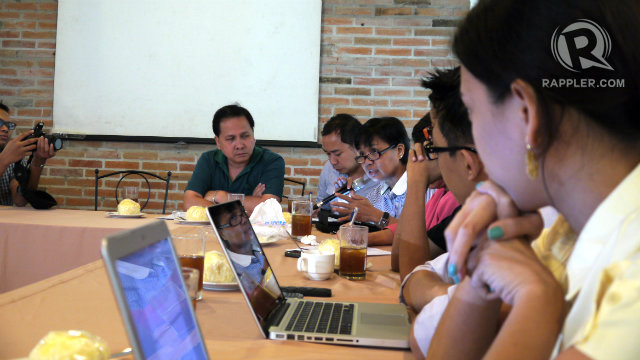SUMMARY
This is AI generated summarization, which may have errors. For context, always refer to the full article.
MANILA, Philippines – The justice secretary becomes an all-powerful “firewall” who can take down any online content and keep it offline for as long as the government wants, a lawyer who has studied the newly signed cybercrime law warned on Monday, September 24.
At a forum organized by the National Union of Journalists of the Philippines (NUJP) and the Philippine Press Institute (PPI), journalists said that while conditions have improved since the dark days of martial law, new restrictions make the situation tough for media organizations today.
They have singled out Republic Act No. 10175 or the Cybercrime Prevention Act, signed by President Benigno Aquino III on September 12 but which lawyers and media organizations said would extend liability for libel and allow the arbitrary closure of websites.
Lawyer JJ Disini of the UP College of Law said that under the law, Justice Secretary Leila de Lima, in her capacity as head of the justice department, becomes a one-person “Great Firewall of China.” Disini refers to China in this case in relation to its efforts to censor online content.
If a complaint is made, the take-down provision stipulated in the law empowers the Secretary of Justice to act immediately to censor online content, according to Disini. In addition, there are no guidelines on when or for how long the content should be blocked.
“Because the take-down is ordered by the Secretary of Justice, there are no limitations to that power. There are no provisions that say when or how long that take down is for, it could be forever,” Disini said. “Any content could be immediately taken down, there’s no need to follow up with a prosecution… it could end right there.”
Thus, the new law makes Secretary of Justice “the most powerful person on the Internet,” leaving opportunity for abuse without accountability, according to Disini.
“These are threats to freedom of speech, threats to freedom of press, without even a court order requiring the complainant to establish beyond a reasonable doubt that libel has been committed. Immediately the remedy he seeks is available. And he doesn’t even have to follow up with a criminal complaint,” Disini explained.
Luis V. Teodoro from the Center for Media Freedom and Responsibilty said that the new law only further impedes honest journalists from working within “a system that is practically built for the opposite.”
“It betrays transparency and freedom of expression,” added Alwyn Alburo, vice chairperson of the NUJP.

Forced silence
Journalists who attended the forum agree that the “law commands forced silence,” and that fear of prosecution is enough to keep journalists from doing their work.
With each and every published replication of the proposed “libel” considered a separate offense under the new law, content creators would need to think twice before posting.
“President Aquino knowingly signed the law, this is already his law. This is an Aquino law,” said blogger Tonyo Cruz.
“The responsibility for bringing this law into life goes to the President, because without his signature, this trash would remain trash,” Cruz said. “But because of this signature, it’s become law…. this is the President’s scandal.”
Journalists at the forum said they are finalizing plans on how to best address the concerns raised about the new cybercrime law.
Others though pointed out it was time to stop the abuses rampant on social media. Social media activists Janette Toral and Juned Sonido cited the case of Chris Lao, a victim of cyberbullying, and said they welcomed regulations to prevent cyberbullying. Lawyer JJ Disini said it would’ve been acceptable if the law had been specific against cyberbullying, but said he worried about its extremely broad powers.
Lawyers have said that they will ask the Supreme Court to repeal the law. Lawyer Harry Roque, for example, said the law violates United Nations conventions on human rights.
Communications Undersecretary Manolo Quezon said the online community is free to question the law. “It is important that a discussion is taking place. A consensus is emerging. It is not written in stone, and the more that you are able to get others to join your point of view, and find a sponsor who will amend that,” Quezon said at the Social Good Summit Manila 2012, which was organized by Rappler and Tweetup Manila. – Rappler.com
Add a comment
How does this make you feel?
There are no comments yet. Add your comment to start the conversation.